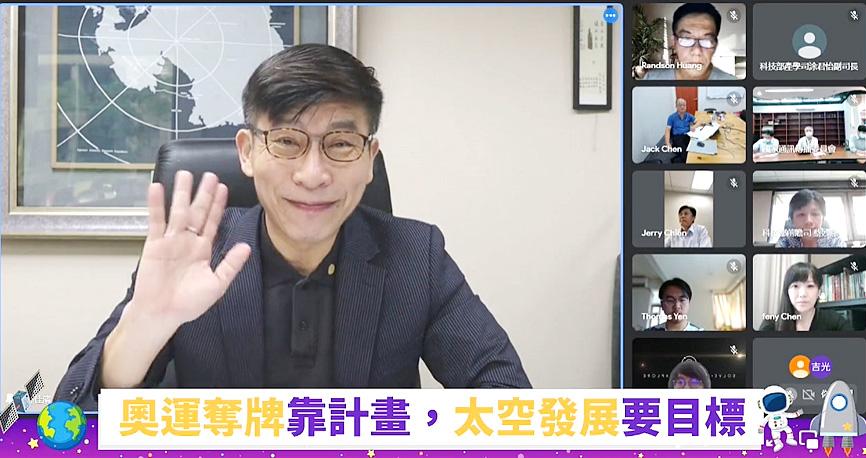Despite the government’s rallying call to bolster the local space industry, many industrial representatives at an online forum yesterday questioned authorities’ capacity to do so.
While the Space Development Act (太空發展法) has been promulgated, its supervising agency, the Ministry of Science and Technology, did not present a clear road map for space development, forum organizer and Democratic Progressive Party Legislator Chung Chia-pin (鍾佳濱) said.
The primary goal is to make the nation an internationally valued actor in space and next-generation satellites, particularly in low-orbit satellites and ground station equipment, National Space Organization (NSPO) Director-General Wu Jong-shinn (吳宗信) said.

Screen grab by Chien Hui-ju, Taipei Times
The NSPO would boost partnerships with local firms and provide testing platforms for domestically developed components, Wu said, adding that a planned science park in Pingtung County would be a new hub for industrial innovation and the space industry.
Some local businesses have asked whether promoting industrial development is the NSPO’s primary concern, Metal Industries Research and Development Center analyst Chen Ching-hui (陳靖惠) said, asking if the Ministry of Economic Affairs would be more qualified to lead the task.
The NSPO mainly works on government missions, but does not actively explore business opportunities for local firms, Liscotech System Co general manager Jack Chen (陳良豐) said.
Developing advanced components for satellites takes a long time, but many businesses cannot get funding until the end of a project, he said.
The government imposes strict limits on funding applications, which is unfavorable for small and medium-sized firms if they aim to engage in long-term research and development, Odysseus Space executive business assistant Eric Hsu (許閔荏) said.
Established by Jordan Vannitsen in Taiwan in 2016, the company had to shift its research and development base to Luxembourg, which provides more legal and financial support for start-ups, Hsu added.
Amending the Government Procurement Act (政府採購法) might not be easy, but the government could consider extending its funding duration for start-ups, he said.
The government vowed to develop “six core strategic industries” that include defense and space supply chains, but it is questionable whether it has devoted National Development Fund or capital from state-run banks to those sectors, Geosat Aerospace & Technology Inc chairman Lo Cheng-fang (羅正方) said.
It should seek opportunities in international cooperation for the local space industry, and develop launch vehicles to help other countries get small satellites and cubesats into space, he said.
Taiwan’s warming relations with Europe present a good opportunity to do that, Lo said.
Letscom International general manager Randson Huang (黃文杰) asked whether the NSPO is assisting or competing with local firms, and whether it would transfer technologies to them.
As Taiwan is not a UN member, previous negotiations over satellite communications frequency use in low-Earth orbits had been done through non-government and amateur radio channels or with another country’s help, Huang said, asking how the government plans to develop satellites for commercial use.

US climber Alex Honnold is to attempt to scale Taipei 101 without a rope and harness in a live Netflix special on Jan. 24, the streaming platform announced on Wednesday. Accounting for the time difference, the two-hour broadcast of Honnold’s climb, called Skyscraper Live, is to air on Jan. 23 in the US, Netflix said in a statement. Honnold, 40, was the first person ever to free solo climb the 900m El Capitan rock formation in Yosemite National Park — a feat that was recorded and later made into the 2018 documentary film Free Solo. Netflix previewed Skyscraper Live in October, after videos

Starting on Jan. 1, YouBike riders must have insurance to use the service, and a six-month trial of NT$5 coupons under certain conditions would be implemented to balance bike shortages, a joint statement from transportation departments across Taipei, New Taipei City and Taoyuan announced yesterday. The rental bike system operator said that coupons would be offered to riders to rent bikes from full stations, for riders who take out an electric-assisted bike from a full station, and for riders who return a bike to an empty station. All riders with YouBike accounts are automatically eligible for the program, and each membership account

A classified Pentagon-produced, multiyear assessment — the Overmatch brief — highlighted unreported Chinese capabilities to destroy US military assets and identified US supply chain choke points, painting a disturbing picture of waning US military might, a New York Times editorial published on Monday said. US Secretary of Defense Pete Hegseth’s comments in November last year that “we lose every time” in Pentagon-conducted war games pitting the US against China further highlighted the uncertainty about the US’ capability to intervene in the event of a Chinese invasion of Taiwan. “It shows the Pentagon’s overreliance on expensive, vulnerable weapons as adversaries field cheap, technologically

NUMBERs IMBALANCE: More than 4 million Taiwanese have visited China this year, while only about half a million Chinese have visited here Beijing has yet to respond to Taiwan’s requests for negotiation over matters related to the recovery of cross-strait tourism, the Tourism Administration said yesterday. Taiwan’s tourism authority issued the statement after Chinese-language daily the China Times reported yesterday that the government’s policy of banning group tours to China does not stop Taiwanese from visiting the country. As of October, more than 4.2 million had traveled to China this year, exceeding last year. Beijing estimated the number of Taiwanese tourists in China could reach 4.5 million this year. By contrast, only 500,000 Chinese tourists are expected in Taiwan, the report said. The report